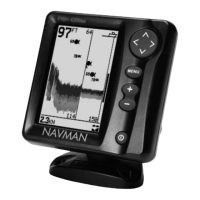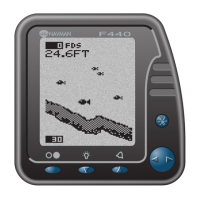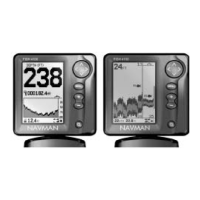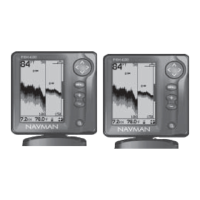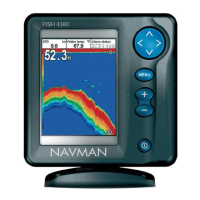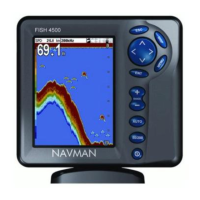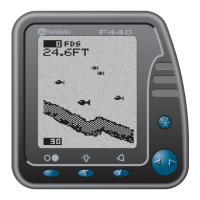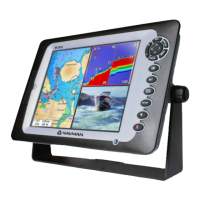Do you have a question about the Navman Fish 4431 and is the answer not in the manual?
Describes the features and capabilities of the NAVMAN fishfinder device, including its functions and specifications.
Explains how the fishfinder can be used as an aid for navigation, locating features, and recognizing fishing spots.
Provides guidance on using the fishfinder to locate fish by identifying underwater features like reefs and wrecks.
Details the steps for connecting the power cable and transducer to the fishfinder unit, ensuring watertight connections.
Identifies the function of each key on the fishfinder and explains basic operational definitions like 'Press' and 'Hold'.
Instructions on how to turn the fishfinder device on and what to expect during the startup sequence.
Explains how to navigate through the main menu options of the fishfinder using the cursor and select keys.
Describes the display and function of the HISTORY screen for viewing sonar echoes received over time.
Details the ZOOM screen, its split-screen layout, and how to use it for closer examination of underwater features.
Explains the SONAR screen, its echo display, and its use for determining bottom hardness and fish species.
Describes the NAVIGATE screen, showing critical information like water depth, boat speed, and bottom profile.
Outlines the information displayed on the DATA screen, including temperature, battery voltage, logs, and speed.
Explains how to use the RANGE menu to select Auto or Manual depth ranges for the display.
Details the fishfinder's alarm system, including types, settings, and automatic re-enabling behavior.
Provides detailed instructions on operating the HISTORY screen, including range and gain adjustments.
Explains how to adjust the gain (sensitivity) of the fishfinder for optimal detail display and noise reduction.
Guides users on interpreting the HISTORY screen, focusing on fish arches, echoes, and factors affecting their visibility.
Discusses fish detection methods, symbol options (ON/OFF), and how SBN sonar interprets signals.
Explains how echo strength and shading on the HISTORY screen indicate different underwater objects and bottom types.
Explains sonar shadows, areas fishfinders cannot 'see', and fish hidden in bottom echoes due to strong returns.
Illustrates how the sonar display changes when the boat is moving, showing historical data and echo patterns.
Illustrates sonar display behavior when the boat is stationary, showing a flat bottom trace and consistent echoes.
Details operating the ZOOM screen, including Bottom Lock functionality and how to adjust magnification.
Explains the SONAR screen for identifying bottom types and fish species, including echo strength and shading.
Describes how to interpret bottom traces on the SONAR screen to identify hard vs. soft bottoms based on echo strength.
Explains how fish species and echo strength on the SONAR screen can help identify different types of fish.
Guides on adjusting the Shading Bar to differentiate echo strengths on the SONAR screen for better clarity.
Details how to adjust Manual Gain on the SONAR screen for enhanced detail or reduced noise interference.
Explains the NAVIGATE screen for displaying critical real-time information like depth and speed while traveling.
Describes the DATA screen, showing temperature graphs, battery voltage, engine hours, and speed data.
Explains how to use the RANGE menu to adjust depth range settings and select between Auto and Manual modes.
Details how to configure and enable various alarms like Too Shallow, Too Deep, and Low Battery for safety.
Explains how to set units for depth, temperature, and speed according to user preference for accurate readings.
Describes options for displaying fish symbols or dots on the screen for better fish detection visualization.
Guides on adjusting the screen contrast level for optimal visibility in various lighting conditions.
Explains how to enable or disable the split zoom screen for enhanced viewing of sonar data.
Details how to select and reset Trip Log or Total Log entries on the FISH 4431 model for distance tracking.
Covers initial setup options like language, keel offset, and calibration during the installation process.
Provides instructions for calibrating temperature, fish filter, and boat speed sensors for accurate readings.
Explains how to reset all fishfinder settings back to the manufacturer's default configurations.
Lists all standard components provided with the FISH 4430/4431 fishfinder package for installation.
Describes optional transducers and other accessories available for enhancing the fishfinder's functionality.
Explains the two mounting arrangements (flush and bracket) for the display unit, considering placement factors.
Details two wiring methods (Basic and Auto Power) for connecting the fishfinder to the boat's power system.
Explains how to connect the fishfinder to other NAVMAN instruments using the NMEA protocol for data sharing.
Provides steps to diagnose and resolve issues where the fishfinder fails to power on, checking connections and battery.
Addresses potential reasons why the fishfinder cannot be turned off, often related to auto power wiring or ignition status.
Offers solutions for common erratic behaviors like incorrect readings, signal loss, or interference from other devices.
Covers problems with the bottom not displaying or appearing incorrectly on the screen, including range and transducer issues.
Addresses issues like wrong language display, beeping without display, or incorrect readings due to settings.
| Waterproof | Yes |
|---|---|
| Sonar Type | Dual Beam |
| GPS | Yes |
| Waterproof Rating | IPX7 |
| Transducer | Included |
| Display Type | Color TFT |
| Frequencies | 200 kHz |
| Depth Capability | 457m |
| Display | Color TFT |

